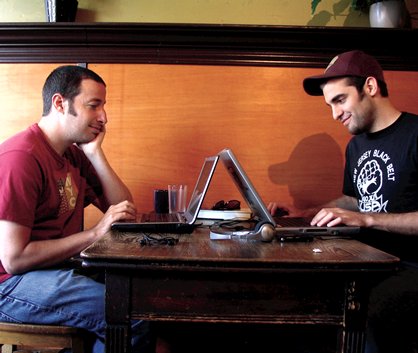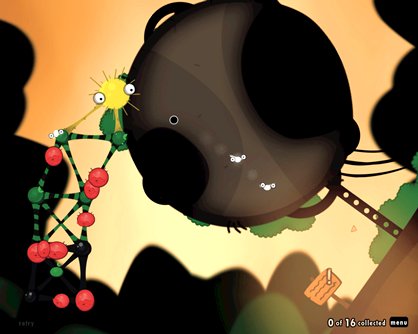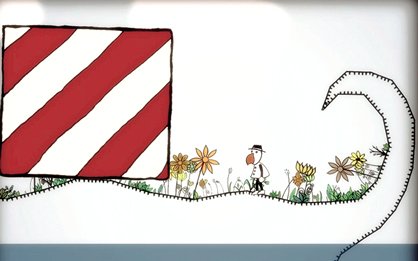How indie games took on the world (and won)
Meet the maverick heroes of game development
“Indie development is still kinda all over the place – everyone has a different definition of what being indie means and what they believe indie games should focus on. We all seem to have very different goals, but I’d like to think we all have an understanding of what advantages we have over the mainstream being indie and use them. Basically I think we all try and take big risks when it comes to innovation, content and theme that a mainstream studio wouldn’t ever be OK with getting behind.”

Above: Is it possible that 2D Boy (World of Goo) is better at smiling AND touching computers? Answer: suspect for further investigation
Which brings up the issue of who that ‘we’ is. Clearly, indie developers are scattered all over the world, but specific communities have sprung up. Perhaps the most interesting is the US fraternity that McMillen is a part of – also comprising folks such as 2D Boy, hyper-prolific one-man experimental developer Cactus and designer/blogger Derek Yu (involved with indie favesAquariaand Spelunky). Were you to visit, say, the Independent Games Festival at GDC, you’d find a lot of these guys hanging out together.
“I personally talk to all the hipsters in our little scene,” says McMillen. “I think it’s important as an artist to have an understanding of where everyone’s coming from. I’ve recently realized that the most valuable thing you can have in life is perspective, and that’s something you can’t make up in your head without personal experience or a good understanding on how others view and understand things. It’s very inspiring to talk to other artists about their work. It’s a huge motivator to see others doing what I’m doing, it’s very validating to talk to someone with your same interests and bounce ideas back and forth, that’s probably why I enjoy working with so many different people.”
That’s a profound difference between indie and mainstream gaming – ad-hoc communities coming up with a constant torrent of absurd and wonderful new ideas and egging each other on, as opposed to offices of desk jockeys slaving away on a contracted project.

“I do feel like there’s a shared current we’re all drifting on” says Ron Carmel, “and there’s a sense of togetherness in being the underdogs of the game industry. Maybe one day we’ll overthrow EA and ActiBlizzard and a new generation of underdogs will come to kick our butts into extinction. That would make me happy. I recently found out that when EA started out, they were all about treating the game developer as an artist and giving them photo credit on the box, much like musicians being promoted as the stars by record companies. Goes to show you, everything has a half-life, and eventually, everything turns to lead.”

Above: Blueberry Garden looks nothing short of delectable. But where are the blueberries?
Weekly digests, tales from the communities you love, and more
The other half of 2D Boy, Kyle Gabler, supports the idea of a close-knit indie community. “Almost all the indie developers seem to know each other, brought together by sites like TIGsource, indiegames, and the common desire to suffer together and hopefully make good stuff without cash. It’s like in the end of Speed when Keanu tells Sandra that they might just like each other because horrible situations bring people together. I got to go to Sweden last week to hang with some of the scary talented Swedish indie kids, and luckily our common indie goals and understandings to grow curly moustaches translates across all languages, races, and cultures.”


